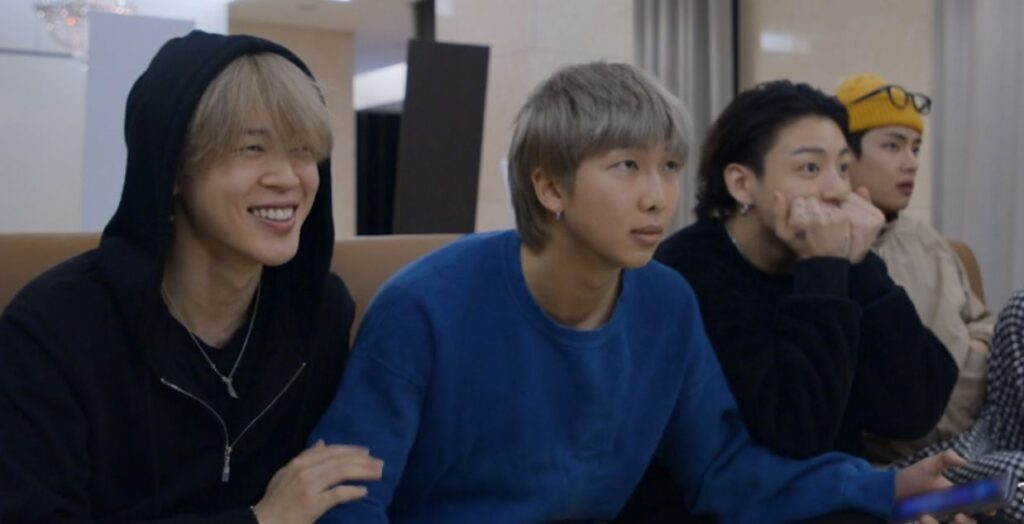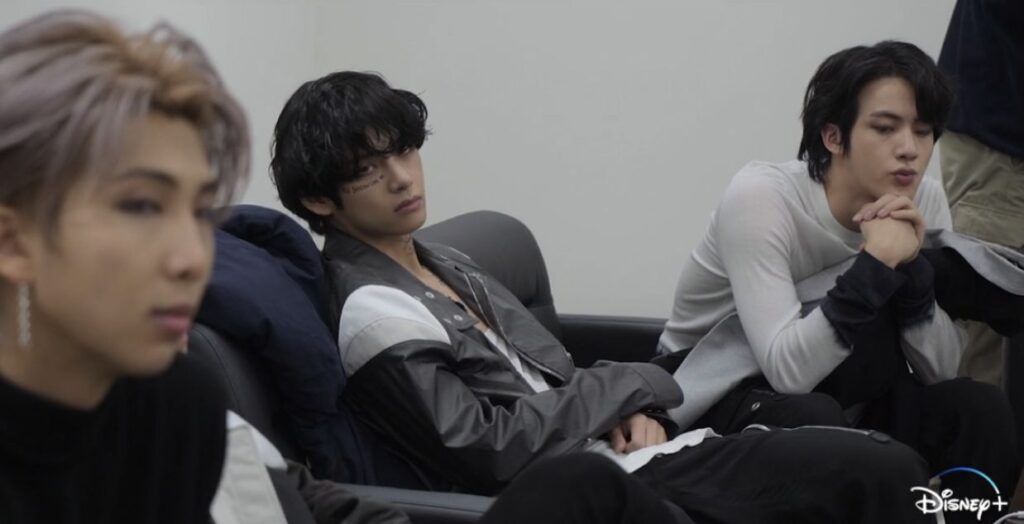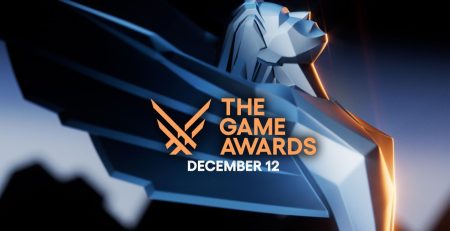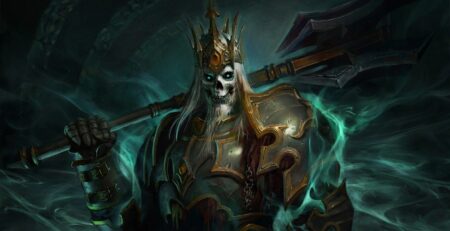One of the reasons I made it through the pandemic was because I was able to find a community in BTS ARMY by watching the concert performances together with a good friend at a ridiculous hour in the US. Now, BTS Monuments: Beyond the Star offers audiences a never-before-seen look into the lives of RM (Kim Nam-joon), Jin (Kim Seok-jin), SUGA (Min Yoon-gi), j-hope (Jung Ho-seok), Jimin (Park Jimin), V (Kim Tae-hyung), and Jung Kook (Jeong Jung-kook) through never-before-seen interviews and personal footage. The Disney+ documentary series shows us their grief around losing the 2020 world tour because of the COVID-19 pandemic, the difficulties they endured at the start of their careers, and their resiliency through it all.
BTS Monuments: Beyond The Star will take audiences on an in-depth journey across the band’s 10-year career, highlighting their highs and lows for the first time ever in a captivating docuseries format. While the series features interviews with HYBE Chairman Bang Si-Hyuk and BEYOND THE STORY: 10-YEAR RECORD OF BTS author Kang Myeongseok, BTS Monuments: Beyond The Star feels more like a personal story that intimately explores the band’s key moments over the years.
The docuseries serves as a historical account of the band’s journey, from its inception to their debut preparations and winning of the Best New Artist award at the 2013 Melon Music Awards. It also sheds light on their struggles during the “Danger” period, their first concerts, debut at the American Music Awards and the Billboard Music Awards, their rise to stardom in America, their address at the UN, performance at the Rose Bowl Stadium, the thrill of performing at London’s Wembley Stadium and much more.
Even when highlighting their accomplishments, the docuseries never loses sight of their humanity. They are stars. They are idols, but they’re also boys who became men in front of South Korea and then the world. BTS Monuments: Beyond The Star gets personal by diving into moments from their past. This included how they felt about meeting each other for the first time, their initial contract renewal process, and the difficulties of isolation during COVID lockdowns. But it isn’t only focusing on just the somber. The docuseries also embraces the sweet side by showing audiences small, lighthearted moments like the boys coming together at Jung Kook’s high school graduation ceremony or celebrating in LA together.

This holistic approach to telling BTS’s history is not only endearing but empathetic. “Using that time to look back on ourselves and study ourselves,” j-hope shares, and that is ultimately what frames BTS Monuments: Beyond the Star as a docuseries. A study of the past while understanding the impact of the present in a heartfelt and grounded way. Jimin adds that they needed to “organize our thoughts through the years pertaining to our reasons for doing what we do.” As much as we are watching them, the men of BTS are also looking at themselves and the decisions they’ve made.
It’s an inward look that captures the men of BTS. The series is a behind-the-scenes look at the men on what feels like their terms and at their most emotional. Some one-on-one talks with producers are hard to watch because of how emotional they are. But they’re necessary not to see RM, Jin, SUGA, j-hope, Jimin, V, and Jung Kook as performers we admire but as people who are trying their best to communicate to the world and connect to it and each other through their art.
The members of BTS have never hidden how hard they’ve worked in the industry in order to break out from being defined in any specific way or only seen in one country. Seeing it all in context against the old practice and performance videos with narration over it? Everything becomes extremely impactful. When presented in this context, you get the chance to appreciate their youth and how it was spent performing.
There isn’t enough appreciation for how the artists we love have truly spent their lives entertaining us, guiding us, and supporting us in our toughest times, even without ever knowing who we are. When you look at them as kids performing against how the first episode opens on them as men, the difference is stark, and each of their interviews is able to show the weight they’ve carried and how they’ve matured.
As we see them during their debut, we hear them recount just how hard it all was. “Hardship was an expectation of that time,” Jung Kook says before continuing: ” I wouldn’t be able to do it again if someone asked me to.” That hardship was physical when it came to performing and only got harder as they succeeded. But it was mental as each of the men reflected on their insecurities and how hard it was to steel themselves in front of others at debut but also during the “Danger” years when they felt burnout hit but didn’t have the words to express themselves as we do now in a culture of self-care.

In a powerful moment, we hear them each discussing how much harder everything got as they kept succeeding. They just kept running toward more acclaim, more success, always more, but in doing so, their dedication took a toll on their bodies, and they had to ask themselves whether or not to keep moving forward. “We should destroy it ourselves since we built it,” SUGA says. “That’s what we need to do to live.” It’s easy to understand their pain and difficulties, and it’s grounding to hear how “small” they felt given the height they’ve been able to reach with their group and solo projects.
While existing fans watching will see more of what we’ve seen in Vlives and in their interviews on Weverse regarding their hard work in the early years, there is something special to see it presented in context with the past in a conversation with where the men are now that feels special. In order to truly appreciate how far RM, Jin, SUGA, j-hope, Jimin, V, and Jung Kook have come, you have to appreciate the struggle involved. Every single member allows the audience to see highly personal moments that honestly make this series more intimate than any of the other documentary films about the band.
This year, each of the members entered the armed forces to serve their mandatory military service. BTS Monuments: Beyond The Star coming after this feels like closing a chapter for the band. But more importantly, it all feels like it’s done on their terms. Emotion is present in every one of the behind-the-scenes moments and in each interview as we see the stories of growth and, ultimately, of love for music. These men are artists, and their music is a way to connect to a larger world around them, and those connections continue even as they say goodbye for now.
The last important element of BTS Monuments: Beyond The Star is how ARMY, BTS’s fans, are taken into consideration. As we see their history unfold, we also see their unique relationship with their fan base, which was formed during their toughest time. In an emotional moment, we see BTS perform “2! 3!” on stage and hear about the importance of sharing heartbreak and troubles with fans as much as triumphs. In fact, author Myeong Seok-kang explains that BTS’s willingness to connect with their fans through pain and sadness is what has helped make their relationship with ARMY a phenomenon of sorts.

When describing the importance of their first fan song being sad instead of happy, the members explain that it was because they wanted the connection to be honest and, more importantly, to be a heartfelt thank you to the fans who know the rumors and hardship they were put through in the public eye in those early years and even until today. They don’t rehash any rumors or even dive into how the band was seen as smaller than others because of their company or belittled for being K-pop idols; instead, as Jimin says, “If you know, then you know.” They don’t gloss over the adversity but instead only focus on the ones they can control, instead of the thoughts of others.
It’s clear that ARMY’s connection to BTS and how it is reciprocated is something special, something sincere on both sides. It’s something I’ve felt before and why I carry around a keychain that says, “Remember, there is a person here in Korea, in the city of Seoul, who understands you.” It’s a quote from Jimin in 2020 as the group bid congratulations to graduates. If you’ve wondered why fans of BTS connect so deeply to their music and their struggles, BTS Monuments: Beyond The Star is a window into that, and beautifully so.
BTS is a phenomenon, a once-in-a-lifetime spark of lightning, but it’s through their hard work and sacrifice that they’ve been able to reach the peak of entertainment. Pulling the curtain back on the magic and giving the men the space to tell their story, the good, the bad, and the times they felt more disconnected than not, pulls their world into perspective.
There is a somber current running through the docuseries, but it’s not the only thing that’s there. Locked centrally in the heart of this Disney Plus documentary structure is a look at resiliency and that speaks volumes. Over the course of it, their brotherhood is clear, as is their resolve to support one another on their paths forward, even if they’re not always aligned. To see them move from insecurity to discovering themselves is profoundly beautiful.
BTS Monuments: Beyond The Star is intimate, beautiful, and breathtakingly vulnerable. It’s also necessary viewing for fans and those interested in learning about the band all the same. It’s a beautiful look at a storied career as fans await their return. A good documentary shouldn’t just tell you something but also teach you something. The one thing I hope everyone takes away from it is that vulnerability is strength. Resiliency isn’t just running but understanding when you need to take a break. But most importantly, those watching should take away empathy in all of its forms.
BTS Monuments: Beyond The Star, Episodes 1-2 are streaming now on Disney+, with two new episodes releasing every Wednesday in December and January.
BTS Monuments: Beyond The Star
-
Rating - 10/1010/10
TL;DR
BTS Monuments: Beyond The Star is intimate, beautiful, and breathtakingly vulnerable. It’s also necessary viewing for fans and those interested in learning about the band all the same.





